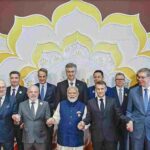
Shallow comparisons between Brazil and Venezuela ignore data, contexts and realities that move away more than approach
I participated, days ago, in a night live on the Forum TV channel. That thing: End of the night… I thought it would be a good way. Easy! But it wasn’t quite like that. I started with stumbling, the speech did not flow. I decided to risk it and launched: “After all, Brazil and Venezuela are not even that different” (Ih, I complicated me – now I need to support this). I argued that both belong to South America (Kotter, are you awake?), Which also depend on commodities (phew, improved), and already began to think that would get away with me (alone, digging the pit itself?) When the petard of Miguel do Rosário came:
– There is a kind of perverse – and increasingly common – simplification that insists on equating Brazil to Venezuela, as if we were on the brink of a similar collapse. It is a rhetoric that does not resist the shorter contact with the facts, but, repeated to exhaustion, ends up generating an artificial panic shadow, useful only to those who profit from fear.
Venezuela has crossed – and still crosses – a deep crisis. With a reduced domestic market, a fragile economy, without a relevant middle class and excessively dependent on oil, he saw his economic sovereignty crumbly in the face of international sanctions, productive collapse and diplomatic isolation. Energy monoculture became a trap: oil, once sustenance, began to support anything else.
Brazil has another plot. Yes, it also depends on the export of commodities – but not one. We are one of the few countries with a diverse portfolio of large -scale primary products: oil, iron ore, soy, corn, cotton, meat, steel, cellulose, among others. There are at least 15 consolidated fronts. In terms of diversity and amplitude, it is another universe.
It is true that the national industry has lost weight in recent decades – has fallen from about 30% of GDP in the 1980s to 11% today. But this number, in isolation, deceives: GDP more than tripled in the period, and the relative reduction of industry is partly due to the growth of other sectors. In addition, the current Brazilian agro -industry is highly technified – with processing, integrated logistics, biotechnology, precision agriculture. Those who still imagine us trapped in an agro -export model of the nineteenth century are unaware of the 21st century Brazilian field.
Another central point is our international presence. Brazil leads or actively participates in forums such as G20, BRICS and COP30. Dialogues with powers from the West and the East. Venezuela, in contrast, isolated itself. Our soft power – although often underestimated – is real. Brazil does not export just commodities: exports culture, democracy, science and diplomacy.
This does not mean that our problems are small. We follow as an unequal country, with precarious infrastructure, extractive elites and a political class, sometimes irresponsible. But our economic and diplomatic foundations are robust. And offer us space to build alternatives.
Venezuela now rehearses a return to growth, pulled by new Chinese investments. It is a relevant data. But this growth starts from an abyss.
It is more than time to abandon caricatures. Brazil is not Venezuela. And it is good that it remains something else: a contradictory country, yes – but with concrete power. Just know what to do with her.
Still a little dizzy with the unexpected class, I decided to degrade Miguel’s speech. I hope I don’t forget it. And I’m glad he is absolutely right, things are really as he says.
Forgiveness for anything.
Source: https://www.ocafezinho.com/2025/07/28/salvio-kotter-brasil-nao-e-venezuela-e-ainda-bem-que-nao-seja/

